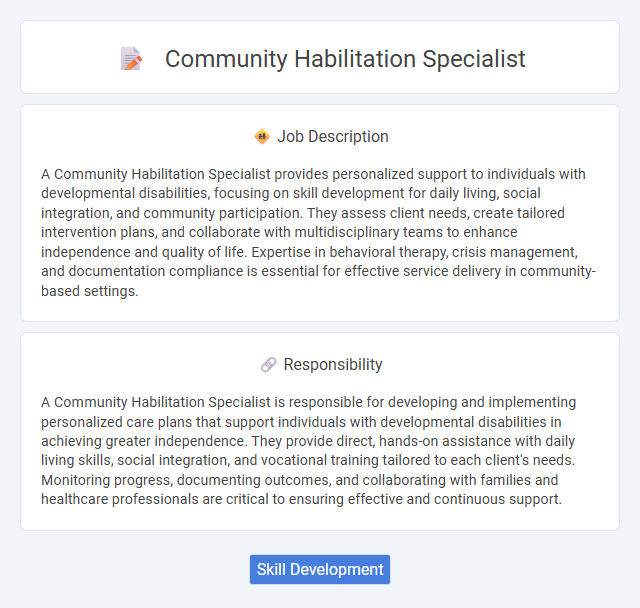
A Community Habilitation Specialist provides personalized support to individuals with developmental disabilities, focusing on skill development for daily living, social integration, and community participation. They assess client needs, create tailored intervention plans, and collaborate with multidisciplinary teams to enhance independence and quality of life. Expertise in behavioral therapy, crisis management, and documentation compliance is essential for effective service delivery in community-based settings.
Community habilitation specialists likely work best with individuals who have developmental or physical disabilities requiring support in daily living and community integration. Candidates with strong empathy, patience, and communication skills are probably more suitable for this role, as they must assist clients in achieving greater independence. People lacking these interpersonal qualities or struggling with adaptability may find this job challenging and less fitting.
Qualification
A Community Habilitation Specialist requires a bachelor's degree in social work, psychology, or a related human services field, accompanied by hands-on experience in developmental disabilities or behavioral health. Certification or licensure relevant to mental health or disability services enhances job prospects and demonstrates specialized expertise. Strong communication skills and knowledge of community resources are essential for creating effective habilitation plans and supporting client independence.
Responsibility
A Community Habilitation Specialist is responsible for developing and implementing personalized care plans that support individuals with developmental disabilities in achieving greater independence. They provide direct, hands-on assistance with daily living skills, social integration, and vocational training tailored to each client's needs. Monitoring progress, documenting outcomes, and collaborating with families and healthcare professionals are critical to ensuring effective and continuous support.
Benefit
Working as a Community Habilitation Specialist likely offers the benefit of making a meaningful impact on individuals with disabilities by enhancing their daily living skills and independence. This role probably provides opportunities for personal and professional growth through specialized training and direct client interaction. Job stability and the potential for flexible working hours may also be considered advantages in this field.
Challenge
A Community Habilitation Specialist may frequently encounter challenges related to addressing diverse client needs within limited resources, requiring adaptability and creative problem-solving. The unpredictability of client progress and varying levels of family involvement can also complicate goal achievement. Navigating complex social systems and coordinating with multiple agencies might add layers of difficulty to effective service delivery.
Career Advancement
Community habilitation specialists can accelerate career advancement by gaining certifications such as Certified Behavioral Health Technician (CBHT) or pursuing a Bachelor's degree in social work or psychology. Developing expertise in individualized care planning and crisis intervention enhances leadership opportunities within healthcare organizations or social service agencies. Networking with professionals in rehabilitation and continuous professional development workshops also contribute to higher positions like program coordinator or clinical supervisor.
Key Terms
Skill Development
Community habilitation specialists play a critical role in skill development by providing tailored training to individuals with disabilities, enhancing their daily living and social skills. They implement individualized plans that focus on communication, vocational competencies, and independent living strategies to improve client autonomy. Expertise in behavioral techniques and adaptive technologies is essential to maximize participant growth and community integration.
 kuljobs.com
kuljobs.com